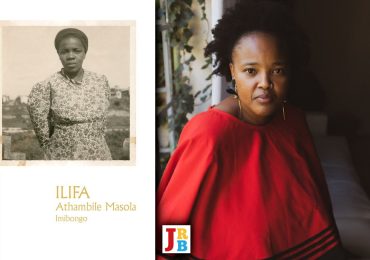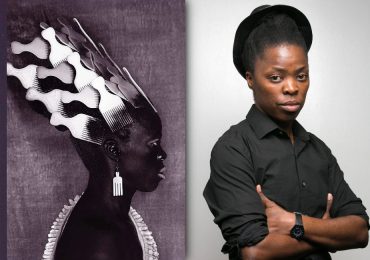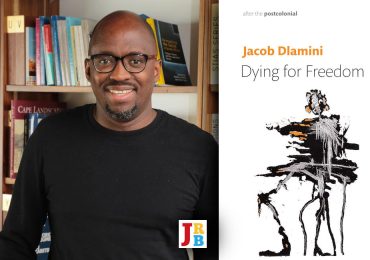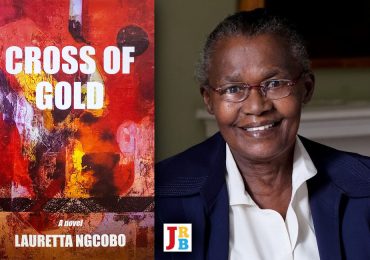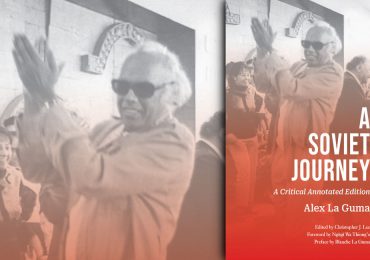The JRB presents an excerpt from a work in progress by Achmat Dangor.
Dangor, a political activist and award-winning author, is a Patron of The JRB.
Read the excerpt:
~~~
Adam closed his eyes and tried to recall a moment of true happiness. Not a simple rite-of-passage bliss that everyone experiences at least once in their lives. And nothing to do with God or religion; heaven knows, both had brought him enough misery. No, it had to be something full of transcendent light and so sublime that it filled his heart with the kind of laughter that cleansed the human spirit.
Oh boy, the things we wish upon ourselves, he thought. Yesterday’s embarrassing—no, truly shameful—incident at the clinic came back to him. More like an electric jolt than a memory.
He twisted about in bed. A sudden, sharp pain hit him in the chest. A week after his surgery, he had once again forgotten the surgeon’s instruction: Don’t strain your chest; you must allow the bones to knit together.
Medical-speak, so Dantesquely sinister. How do bones knit together? All this coming from shifty-eyed doctors who couldn’t look him in the eye and say: The operation was a success and you’ll live a long and happy life—or—Look, it didn’t work and, basically, you’re fucked. Coronary Arterial Bypass and Graft, a ‘CABG’. They kept using jargon as they hovered around his bed, oblivious to the effect it had on him.
In the end, one of the more compassionate doctors, the lead surgeon Milton Ross, did warn him: Open heart surgery has weird and unpredictable effects. Something happens when the heart is stopped and you’re kept alive artificially on bypass. The body’s natural rhythms are disturbed and no one can really predict the effect. It differs from person to person, but beware the tricks your mind can play!
The tricks of the mind after you’ve been ‘CABGed’. Whatever. All he needed was some sleep; real, deep slumber happily born of physical tiredness and the peace of small, inconsequential dreams. He lay on his back and stared into the darkness of his shut eyelids. He thanked the god he didn’t believe in for his relative good fortune. He wasn’t rich, but he did have a steady job, a career of sorts; a ‘pictorial editor’ with a major newspaper, and a photographer—of some renown—in his own right. Yes, he gave up being an accountant years ago.
But that moment of transcendent light intruded. Yesterday he had gone to Dr Milton Ross’s and Dr Mohammed Patel’s surgery for a check-up. He sat in the waiting room, paging listlessly through the magazines on the side table. Tedious, glossy property volumes about all kinds of unaffordable mansions for sale; others about travel to exotic places that he guessed his doctors had never been to. But he tried to pretend that he was preoccupied; there was nothing more boring than having to get into a conversation with a fellow patient. They always talked about how they felt—about to die or miraculously given new life by the cardiologists.
Somewhere nearby there was a creaking noise that kept disturbing him. He looked around. On the other side of the room was a woman in a wheelchair who was constantly moving herself back and forth, as if trying to stretch her back. Must be painfully stiff, sitting like that all the time. Beside her, slumped forward on the couch, was a man who held onto the wheelchair, as if to prevent the woman from wheeling away on her own. Aware that the noise had attracted the attention of other patients in the waiting room, the man whispered something to her. She sat up.
Suddenly she looked very familiar. There, the transcendent light, from her eyes as she opened them.
My God, Lilly, is that you, really you?
Adam thought he was speaking to himself, but he had obviously spoken loud enough for the woman, and the man beside her, to hear. They peered at him, as did some of the other people. He got up and walked across to them, holding his chest and hobbling a little painfully.
‘Lilly, is that you? Are you all right?’ he said as he stood before them.
The man and ‘Lilly’ stared at him in silence.
‘It’s Adam. Remember me? Plintor Mansions, back in the early days.’
‘Hey, leave us alone. Can’t you see my mom’s not well?’ the man said.
‘Are you Alon, Lilly Rosenberg’s son?’
The man’s eyes opened wide, hardened into a glare as his shock turned to anger.
‘My name’s not your business. And my mother’s name is Laelle, not Lilly! Now leave us alone!’
‘Sorry, but can I just ask her if she remembers Uncle Abe and Uncle Bert, or you ask her? You weren’t even born yet. It was quite a long time ago.’
The woman opened her eyes wide, stared at Adam for a moment, turned and spoke in Yiddish to ‘Alon’, before pulling her scarf down across her eyes. That moment of magical light was gone, as abruptly as the day her father, George Rosenberg, had dragged her away from the Plintor Mansions flat.
Alon said something harsh to Adam in Yiddish, but realising he didn’t understand, switched to English.
‘Listen, she wants to be left alone. Go away, whoever the hell you are!’
Suddenly the doctors came into the waiting room.
‘Mister Dawood, Adam, what’s going on here?’ Doctor Patel asked.
‘He’s bothering the poor woman,’ another patient said.
The woman pulled her scarf away from her face, looked at Adam and smiled, then gently shook her head. Milton Ross came up close and spoke to her.
‘Time for your check-up.’
She nodded to him, and to her son, who wheeled her away.
Doctor Patel took Adam’s arm and led him to another room.
It was there, lying down while his blood pressure was being checked by a nurse, that he realised that the woman was indeed Lilly, and that when she shook her head like that she was saying, ‘No more please; let’s just forget about the past.’
Yes, he thought, the past contained so much joy, but somehow always ended in pain.
As did this examination. Not only was his still-tender chest prodded, but the doctors gave him a stern lecture.
First Milton Ross walked in and told him that the woman, whose name was Laelle Iskowitz, not ‘Lilly’, was quite ill. She would probably not live for much longer.
‘Her son, yes his name is Alon, is highly offended. He kept asking his mother how you knew his name. So, Adam, please, no need to create more problems for the poor woman. She is married to a very traditional man who will not take kindly to hints that she knew someone like you, maybe when she was young,’ Dr Ross said.
‘Just like you will create problems within your family, knowing some of them,’ Dr Patel cut in.
Adam nodded, and then Simon, the driver he had hired to bring him to the clinic, was summoned by a nurse. Simon wheeled Adam away and helped him into the car. Adam leaned back, closed his eyes, and started speaking to himself, doing his best not to murmur aloud.
How did our destinies, Lilly’s and mine, intertwine—two young people who loved each other despite our different religious and ethnic beginnings? Through her grandfather, Bert, and my uncle, Abe, who lived together—yes, they were a gay couple. A white, Jewish man and a non-white Malay, in the bad old apartheid days. Uncle Bert ‘came out of the closet’ soon after arriving as a refugee from Nazi Germany and settling down his family. My Uncle Abe ‘left the closet’ when he got a job in town. He and Bert met at one of their offices. Soon after, Abe left the township where his family lived and moved in with Bert.
How angry the rest of our families became when they discovered the intimate relationship between two youngsters. Lilly and I had transgressed religion and race, things that our families were passionate about. When the real passion, between Lilly and me, was discovered, her father came and dragged Lilly down the stairs from the flat we shared with Abe and Bert. My father came soon after to fetch me. And then the families took vengeance on Uncle Bert and Uncle Abe. Not only because they seemingly ‘allowed’ two young people to become so intimate, but also because of their homosexuality.
Bert was driven away in the back of a van, into exile in some remote rural town where another family member lived. Uncle Abe was driven to committing suicide after relentless harassment by his family. His death almost killed me as well.
What a brutal parting it was, for Lilly and I, but worse even for Uncle Bert and my dear Uncle Abe.
But where did it all begin, me leaving home, going to live with my uncle and meeting dear Lilly?
Some years earlier. Probably the day Grannie Gadija—Ouma, as we all called her—gave Yasien, my dad, an ultimatum: ‘This blerrie cheeky boy goes or I do.’
The family couldn’t afford to lose Ouma. She looked after the kids, both Dad and Mum, Surie, worked full time. What’s more, Ouma owned the house we lived in. She could sell it any time she wanted to, like she had often threatened to do.
Where would the family go to? Mum and Dad probably asked themselves.
So, I had to go. Mum arranged for me to live with my other grannie, her mum, Sis Thea. I loved it there, but a few years later Thea fell ill. That’s when I went to live with Uncle Abe and Uncle Bert.
I’ll come back to that day I had so mortally offended Ouma Gadija. First, I must ask myself, how did I know that the man with Lilly was her son, and that his name was Alon?
My god, I saw Lilly about twelve years ago, when I ran into her and her family at that art gallery in Joubert Park, which is close to where Uncle Abe’s and Bert’s Plintor Mansion flat was. She greeted us—Fiona and I—politely, hastily introduced her two children, and then scurried off. I realise now that was the year her husband had died, and they had probably just been to the Lions Schul, which is nearby.
That was also the year my wife left me and returned to Ireland. Fiona said she could no longer take my moods, the dark shadows I slipped into, especially when something surfaced from my past. Did I show too much emotion, there in the shadowy foyer of the Johannesburg Art Gallery, when Lilly hurried away, hustling her grown-up son and daughter along?
‘Mister Dawood, Mister Dawood sir, you are home.’
Adam opened his eyes. They were parked outside his front gate. Simon opened the car door and helped Adam get out.
‘Do you need help to get in, Sir?’ he asked.
Adam shook his head, patted his jacket until he found his wallet and gave Simon a tip.
‘Thanks, I’ll be fine,’ he said and started hobbling away.
As he made his way up the path to his front door, he paused under the old Magnolia tree and inhaled the sweet smell of the blossoms.
It’s time to take control of myself, or try to anyway, he murmured.
There are demons from the past I have to rid my mind of. The best way is to record it all, exorcise my ghosts by laying them out in the light of day. Maybe start with why my grannie wanted me to leave, and the role my mean Uncle Baboo played.
Dear god that I betray all the time, help me to do this.
~~~

